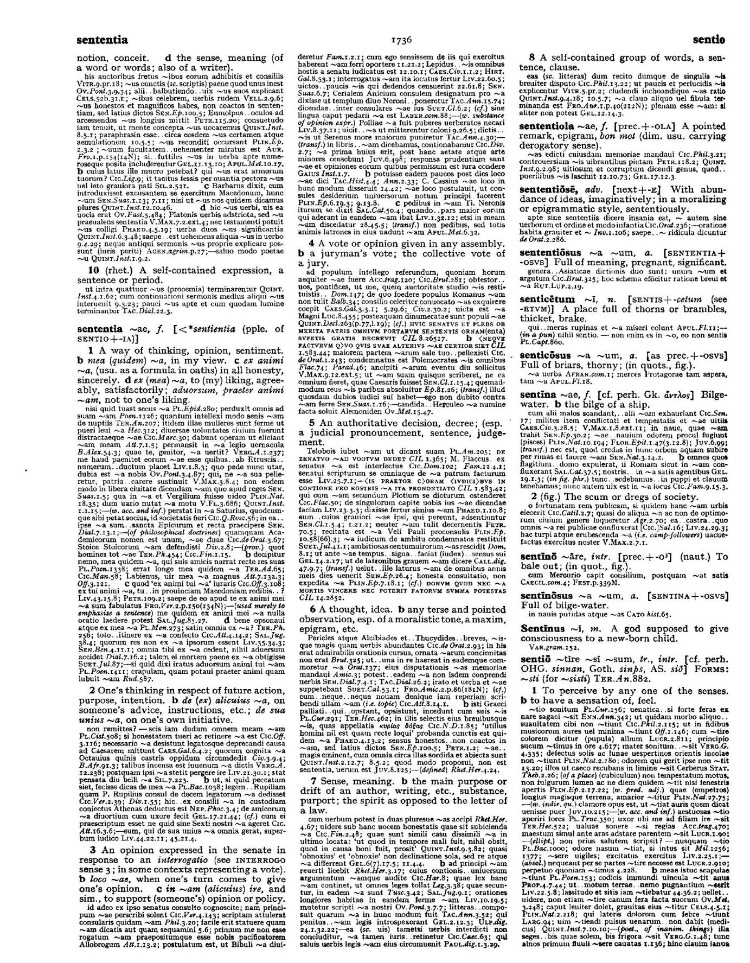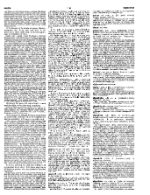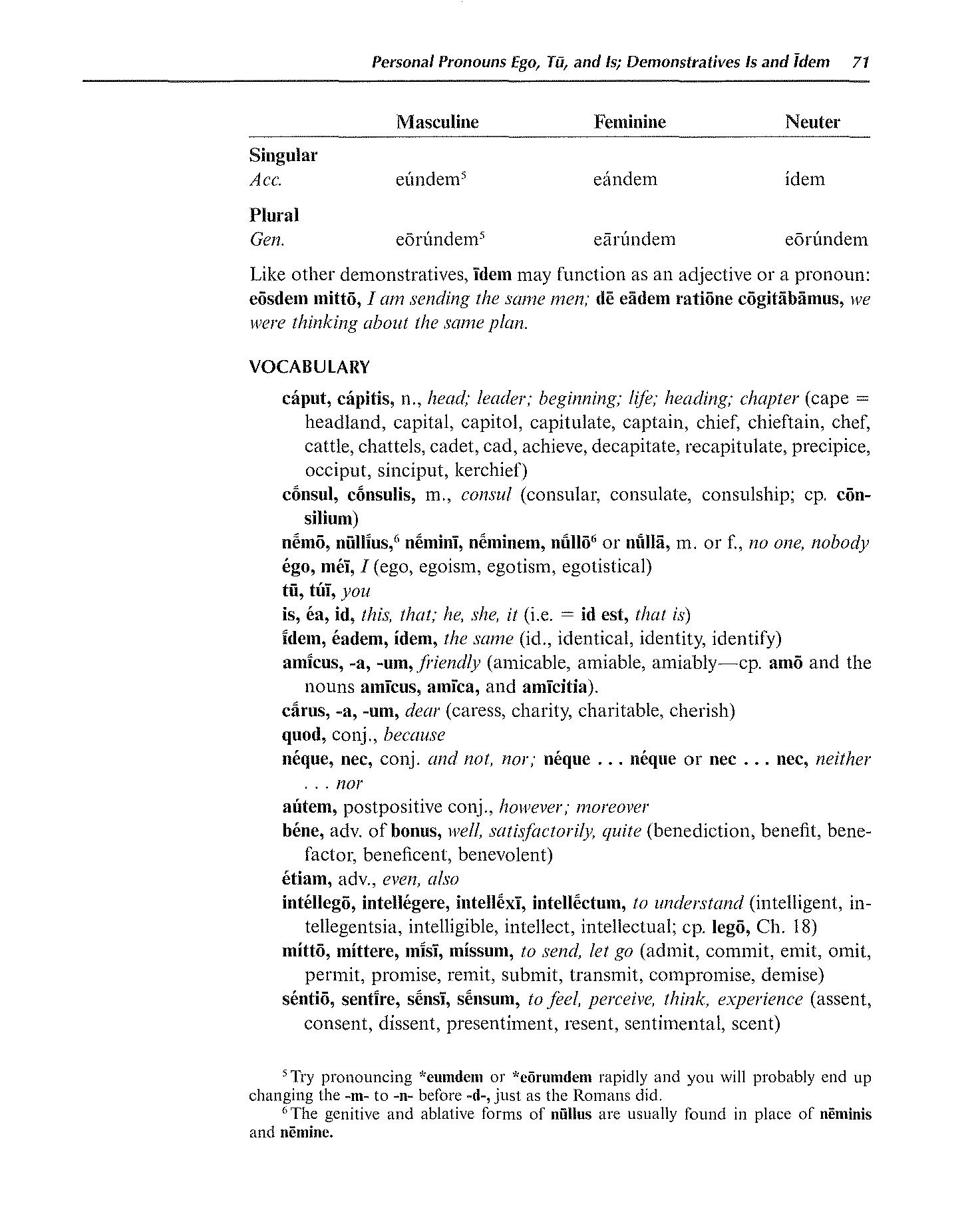
page_listing.tpl
page_subListingDetails.tpl
sub_listingDetails_style1.tpl
sub_listingDetails.title.tpl
sentīre to feel
sentīre is a Latin Verb that primarily means to feel.
Definitions for sentīre
Wheelock's Latin
Verb
- 1
to feel, perceive, think, experience
English derivatives:
assent consent dissent presentiment resent sentimental scent
Oxford Latin Dictionary
Verb
- 1
To perceive by any one of the senses. (b) to have a sensation of, feel.
- 2
To become or be aware of, sense, discern, recognize, etc. (b) (w. acc. and inf.) (c) (w. pred. acc.). (d) (w. indir. qu.). (e) (w. nom. pple., app. in imitation of Gk.).
- 3
(absol.) To have full use of one's senses and faculties, to be alert and conscious.
- 4
(of persons or things) To have experience of, meet with, undergo. (b) to be conscious of, feel (an emotion). (c) to enjoy (a profit, etc.).
- 5
To be affected by, feel the influence of (a physical force, etc.). (b) to have experiemce of, know (a person, etc., in a stated or implied capacity).
Sentences with sentīre
Latin to English
Amor patriae in omnī animō sentiēbātur (sentiētur, sentītur, sēnsus est). Compare In every soul the love of country used to be felt (will be felt, is felt, was felt).
Rara temporum felicitate, ubi sentire quae velis, et quae sentias dicere licet. [Historae, I,1]Compare The rare happiness of times when we may think what we please, and express what we think.
Hominis est enim adfici dolore, sentire, resistere tamen et solacia admittere, non solaciis non egere.Compare For it is the very essence of human nature to feel those impressions of sorrow, which it yet endeavors to resist, and to admit, not to be above, consolation.
Nam ego sentio bonus mens iracundia et amor aufero.Compare For I perceive that my good sense was taken away from me by anger and affection.
Sentio ego, Scipio, omnis aetas mors sum communis.Compare I have perceived, Scipio, that death is common to every age.
Quid scribam vobis, patres conscripti, aut quo modo scribam aut quid omnino non scribam hoc tempore, quam perir me cotidie sentio, si scio.Compare May all the gods and goddesses destroy me more miserably than I feel myself to be daily perishing, if I know at this moment what to write to you, how to write it, or what, in short, not to write.
Sero sentio frustra sui aut pecunia studeo aut imperium, aut opes, aut gloria.Compare They perceive too late that they have in vain pursued money, or power, or influence, or glory.
Populus Romanus eo invictus sum sentio, quod in secundus res sapio et consulo memini.Compare I think that the Roman nation is on this account unconquered, because in prosperity it remembers to be wise and provident.
Conjugation table for sentīre
Cactus2000
| ACTIVE | |
| Indicative present | Indicative imperfect |
| sentiō sentīs sentit sentīmus sentītis sentiunt | sentiēbam sentiēbās sentiēbat sentiēbāmus sentiēbātis sentiēbant |
| Indicative perfect | Indicative pluperfect |
| sēnsī sēnsistī sēnsit sēnsimus sēnsistis sēnsērunt / sēnsēre | sēnseram sēnserās sēnserat sēnserāmus sēnserātis sēnserant |
| Indicative future | Indicative future perfect |
| sentiam sentiēs sentiet sentiēmus sentiētis sentient | sēnserō sēnseris sēnserit sēnserimus sēnseritis sēnserint |
| Subjunctive present | Subjunctive imperfect |
| sentiam sentiās sentiat sentiāmus sentiātis sentiant | sentīrem sentīrēs sentīret sentīrēmus sentīrētis sentīrent |
| Subjunctive perfect | Subjunctive pluperfect |
| sēnserim sēnseris sēnserit sēnserimus sēnseritis sēnserint | sēnsissem sēnsissēs sēnsisset sēnsissēmus sēnsissētis sēnsissent |
Infinitive present sentīre Infinitive perfect sēnsisse Infinitive future sēnsūrum esse | Imperative present sentī sentīte Imperative future sentītō sentītō sentītōte sentiuntō |
| PASSIVE | |
| Indicative present | Indicative imperfect |
| sentior sentīris sentītur sentīmur sentīminī sentiuntur | sentiēbar sentiēbāris / sentiēbāre sentiēbātur sentiēbāmur sentiēbāminī sentiēbantur |
| Indicative perfect | Indicative pluperfect |
| sēnsus sum sēnsus es sēnsus est sēnsī sumus sēnsī estis sēnsī sunt | sēnsus eram sēnsus erās sēnsus erat sēnsī erāmus sēnsī erātis sēnsī erant |
| Indicative future | Indicative future perfect |
| sentiar sentiēris / sentiēre sentiētur sentiēmur sentiēminī sentientur | sēnsus erō sēnsus eris sēnsus erit sēnsī erimus sēnsī eritis sēnsī erunt |
| Subjunctive present | Subjunctive imperfect |
| sentiar sentiāris / sentiāre sentiātur sentiāmur sentiāminī sentiantur | sentīrer sentīrēris / sentīrēre sentīrētur sentīrēmur sentīrēminī sentīrentur |
| Subjunctive perfect | Subjunctive pluperfect |
| sēnsus sim sēnsus sīs sēnsus sit sēnsī sīmus sēnsī sītis sēnsī sint | sēnsus essem sēnsus essēs sēnsus esset sēnsī essēmus sēnsī essētis sēnsī essent |
Infinitive present sentīrī Infinitive perfect sēnsum esse Infinitive future sēnsum īrī | Imperative present sentīre sentīminī Imperative future sentītor sentītor - sentīuntor |
| PARTICIPLE | ||
| Participle present active | ||
| Nom. | sentiēns | sentientēs |
| Gen. | sentientis | sentientium |
| Dat. | sentientī | sentientibus |
| Acc. | sentientem | sentientēs |
| Abl. | sentiente | sentientibus |
| Participle future active | ||
| Nom. | sēnsūrus | sēnsūrī |
| Gen. | sēnsūrī | sēnsūrōrum |
| Dat. | sēnsūrō | sēnsūrīs |
| Acc. | sēnsūrum | sēnsūrōs |
| Abl. | sēnsūrō | sēnsūrīs |
| Participle perfect passive | ||
| Nom. | sēnsus | sēnsī |
| Gen. | sēnsī | sēnsōrum |
| Dat. | sēnsō | sēnsīs |
| Acc. | sēnsum | sēnsōs |
| Abl. | sēnsō | sēnsīs |
| Gerundive | ||
| Nom. | sentiendus | sentiendī |
| Gen. | sentiendī | sentiendōrum |
| Dat. | sentiendō | sentiendīs |
| Acc. | sentiendum | sentiendōs |
| Abl. | sentiendō | sentiendīs |
| Gerund | Supine | |
| Nom. | sentīre | sēnsum |
| Gen. | sentiendī | sēnsū |
| Dat. | sentiendō | |
| Acc. | sentiendum | |
| Abl. | sentiendō | |
Data sources
Notes
- Definitions
- Frederick M. Wheelock, Wheelock's Latin, 6th ed., rev. Richard A. LaFleur (New York, NY: HarperCollins Publishers, 2005): 71.
- P. G. W. Glare, Oxford Latin Dictionary, Vols. 1-8 (Oxford: Clarendon Press, 1982): 1736.
- Word frequencies
- Christopher Francese, "Latin Core Vocabulary," Dickinson College Commentaries, last modified 2014, http://dcc.dickinson.edu.
- Paul B. Diederich, The Frequency of Latin Words and Their Endings, PhD diss., (Columbia University, 1939).
- Louis Delatte, Suzanne Govaerts, Joseph Denooz, and Etienne Evrard, Dictionnaire fréquentiel et index inverse de la langue latine [Frequency Dictionary and Inverse Index of the Latin Language] (Liège, Belgium: Laboratoire d'analyse statistique des langues anciennes de l'Université de Liège [L.A.S.L.A.], 1981): 121.
Bibliography
Allen, Joseph H. Allen and Greenough's New Latin Grammar for Schools and Colleges: Founded on Comparative Grammar. Edited by James B. Greenough, George L. Kittredge, Albert A. Howard, and Benjamin L. D'Ooge. Boston, MA: Ginn & Company, 1903.
Crystal, David. A Dictionary of Linguistics and Phonetics. 6th ed. Oxford, UK: Blackwell Publishing, 2008.
Delatte, Louis, Suzanne Govaerts, Joseph Denooz, and Etienne Evrard. Dictionnaire fréquentiel et index inverse de la langue latine [Frequency Dictionary and Inverse Index of the Latin Language]. Liège, Belgium: Laboratoire d'analyse statistique des langues anciennes de l'Université de Liège (L.A.S.L.A.), 1981.
Diederich, Paul B. The Frequency of Latin Words and Their Endings. PhD diss., Columbia University, 1939.
Francese, Christopher. "Latin Core Vocabulary." Dickinson College Commentaries. Last modified 2014. http://dcc.dickinson.edu/latin-vocabulary-list.
Gildersleeve, Basil L., and Gonzales Lodge. Gildersleeve's Latin Grammar: Third Edition, Revised, and Enlarged. 3rd ed. London, England: Macmillan and Co., 1903.
Glare, Peter G.W. Oxford Latin Dictionary. Vols. 1-8. Oxford, England: Clarendon Press, 1982.
Krüger, Bernd. "Latin Conjugation Tables." Cactus2000. Accessed May 5, 2023. https://latin.cactus2000.de/index.en.php.
Pierson, Nick. "Sound of Text." Accessed October 26, 2019. https://soundoftext.com.
Wheelock, Frederick M. Wheelock's Latin. 6th ed. Revised by Richard A. LaFleur. New York, NY: HarperCollins Publishers, 2005.
Wiktionary Contributors. "Victionarium." Wikimedia Foundation, Inc. Updated March 18, 2019. https://la.wiktionary.org/wiki/Victionarium:Pagina_prima.
Citation
Chicago (17th ed.)
Allo Contributors. "sentiō, sentīre, sēnsī, sēnsum (v.) - Latin Word Definition." Allo Latin Dictionary. Last modified . Accessed January 30, 2026. http://ancientlanguages.org/latin/dictionary/sentio-sentire-sensi-sensum.
Entry created on . Last updated on .








